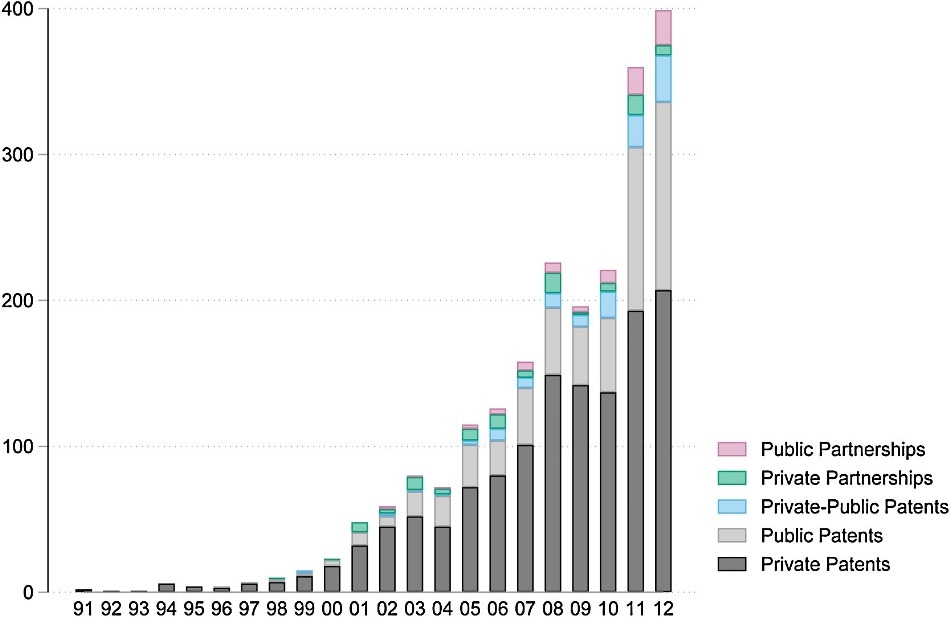Mar 21 2019
“The 21st century has been hailed the nano-century, and major technological breakthroughs are expected from the control of the matter at the nanoscale. However, despite its promises, nanotechnology still seems to be stuck in the status of an emerging science,” contended Raphael Zingg, Assistant Professor of Waseda University and Dr Marius Fischer of the Max Planck Institute for Innovation and Competition.
 Private and public patent applications over time. The Figure depicts the yearly number of patent applications filed (i) independently by private sector entities, (ii) independently by public sector entities, (iii) jointly by private–public collaborations, (iv) jointly by private sector collaborations and (v) jointly by public sector collaborations. (Image credit: Raphael Zingg (Waseda University) and Marius Fischer (Max Planck Institute for Innovation and Competition)
Private and public patent applications over time. The Figure depicts the yearly number of patent applications filed (i) independently by private sector entities, (ii) independently by public sector entities, (iii) jointly by private–public collaborations, (iv) jointly by private sector collaborations and (v) jointly by public sector collaborations. (Image credit: Raphael Zingg (Waseda University) and Marius Fischer (Max Planck Institute for Innovation and Competition)
Their study was reported in Nano Today on February 22nd, 2019. The objective of this team is to provide a better understanding of the problem of technology transfer—that is, finding a way to transfer the knowledge developed by universities to private entities that can subsequently come up with commercial products.
In order to examine this issue, Dr Fischer and Professor Zingg analyzed the combined data on nanotechnology patents by detecting all European patent applications in relation to nanostructures from 1991 to 2016. Their findings revealed that patents filed jointly by public and private organizations are increasing steadily, although on a small level.
“While research institutions still develop the majority of their patents independently, our data fleshes out promising signs that private-public knowledge transfer is coming to fruition. Encouraging an environment where research institutions and private firms engage in collaboration is conducive to innovation in nanotechnology,” wrote Professor Zingg.
Both researchers noted that while the number of nanotechnology patents filed together by research institutions and private firms could still be low in absolute terms, there has been a sharp increase since 2000, and in the recent past, private-public partners have jointly filed 8% of all patents. They also indicated that public patent applications and private patent applications were filed with more patent offices when compared to autonomously-developed public offices, and according to Professor Zingg such inclination to invest in patenting strategies and to achieve a broader geographical protection suggest high internal valuation.
The duo also noted that in certain countries like the U.S. Japan, and France, which are known to have more frequent private-public patents, the overall number of nanotechnology patents is inclined to be higher. It appears that such nations have created dependable frameworks and have established close institutional networks between entities that are active in nanotechnology.
As per the team’s data, two nanotechnology patents granted in Europe are held by Waseda University. One of the patents—a patent on a hydrotalcite-like substance—has been the outcome of a collaboration between a private firm JDC Corporation and the School of Science and Engineering. Both partners have been working on studies related to wastewater treatment systems with nano-layered double hydroxides. Patented in 2004, the said invention was filed in the main jurisdictions across the world.
Collaborative trends in nanotechnology are reflected in the rise of private-public partnerships. The pooling of assets, know-how, and technologies provides innovators with better ways to address the challenges of innovation technology. For countries entering the nano-space, we believe that the creation of industry clusters integrating academic entities has high potential.
Raphael Zingg, Assistant Professor, Waseda University.